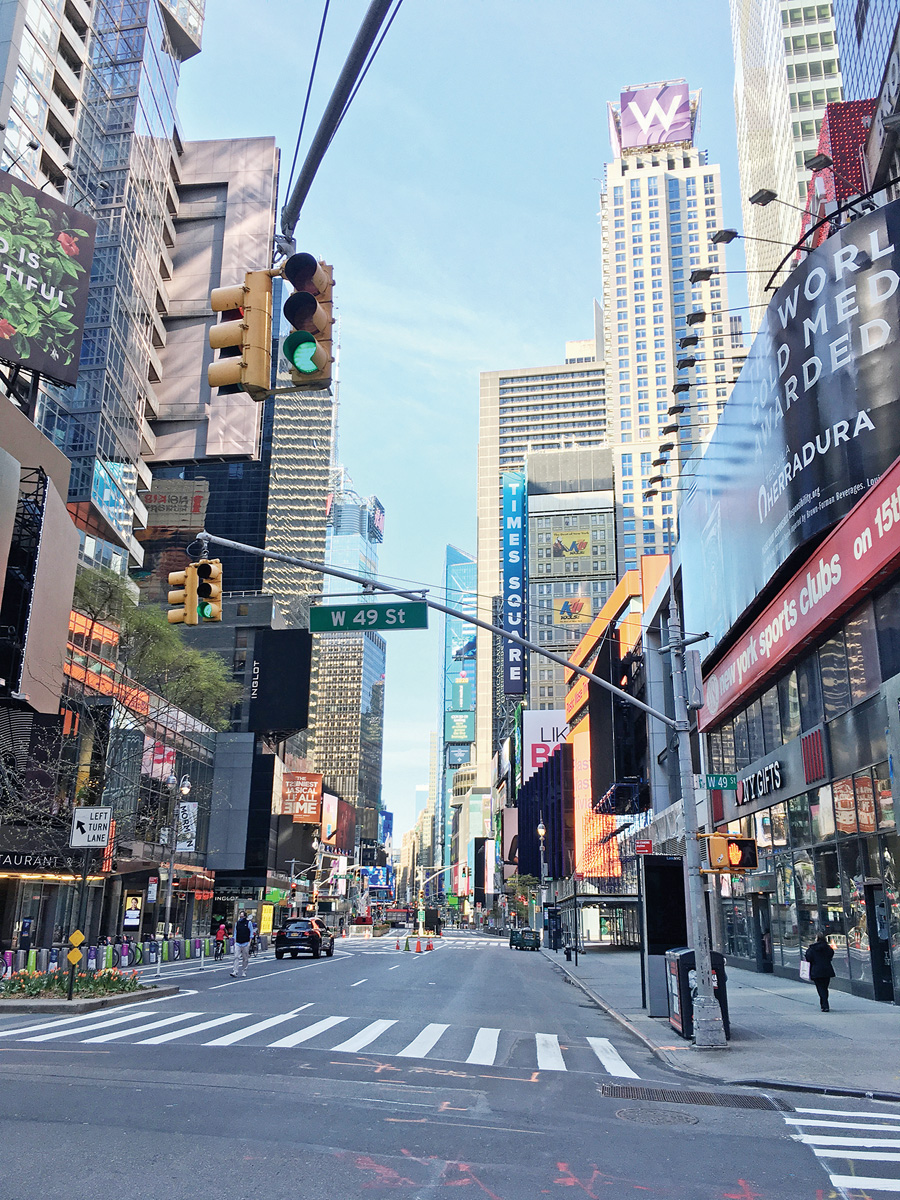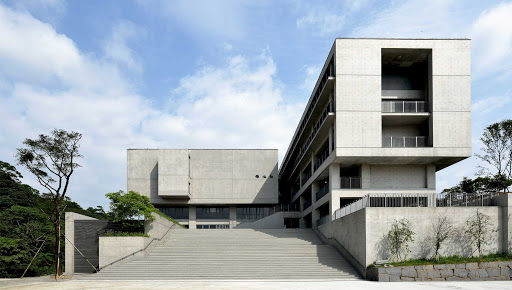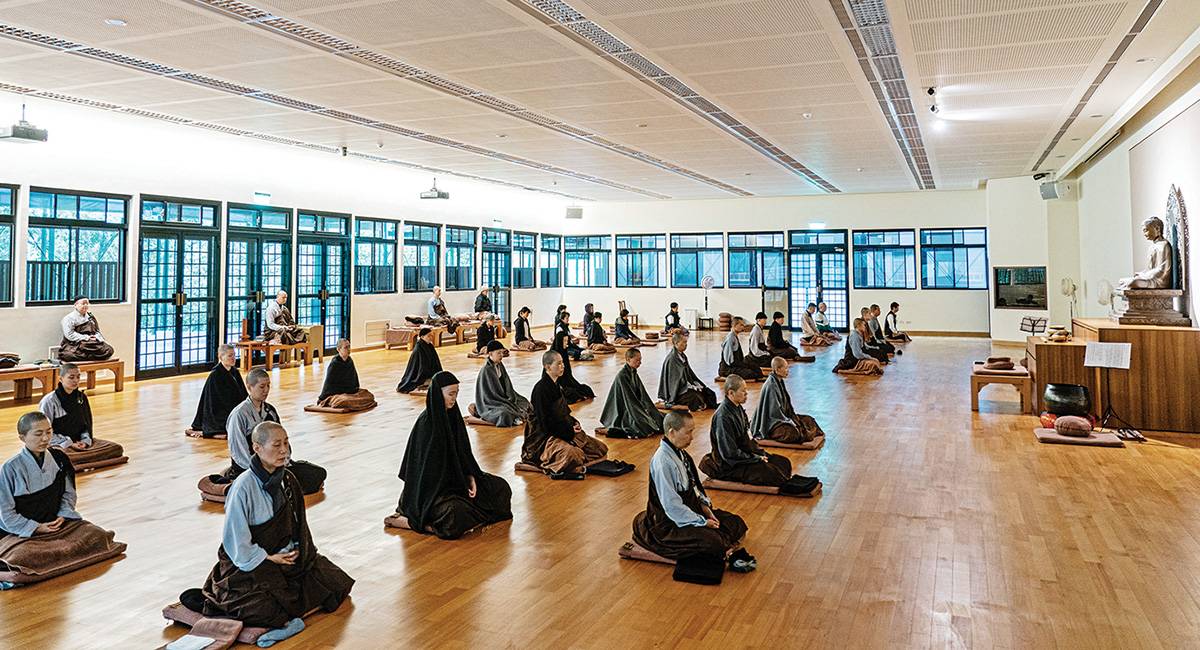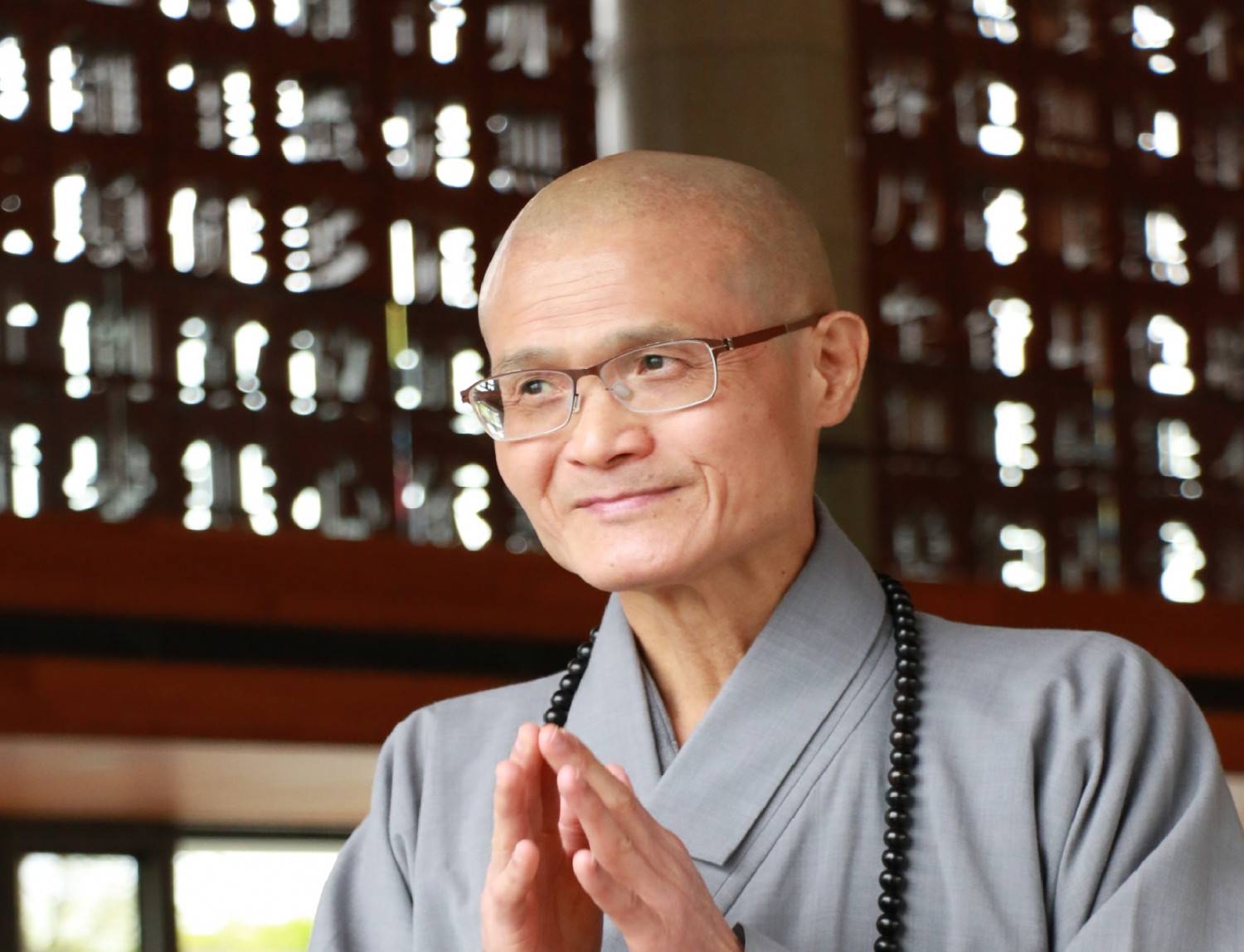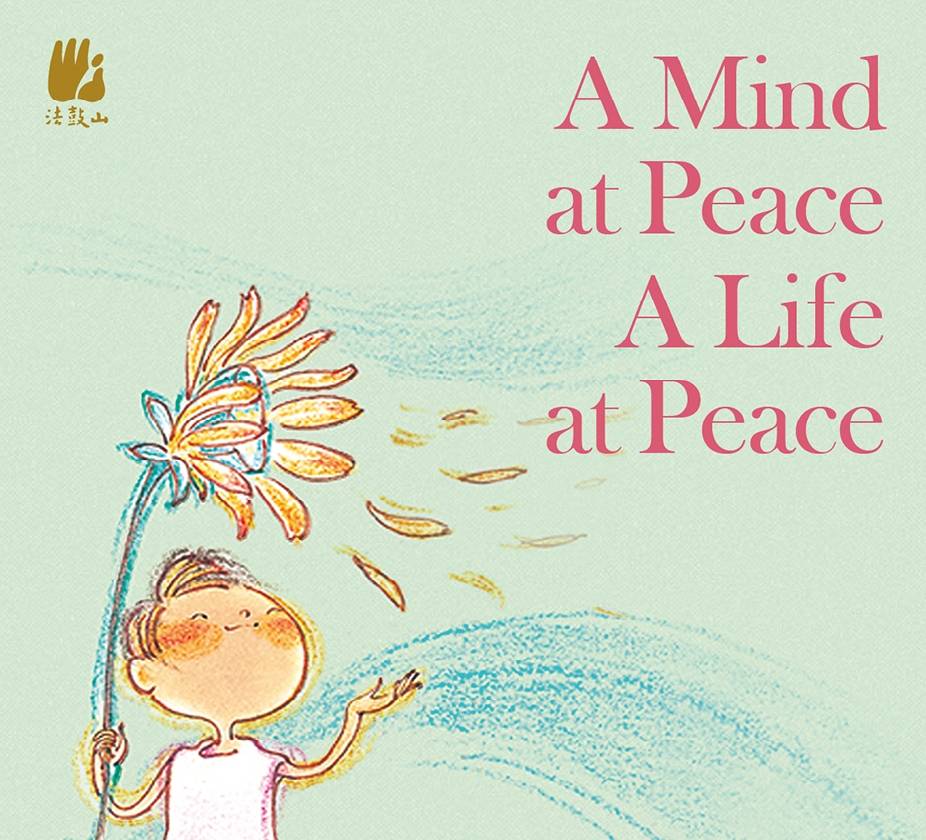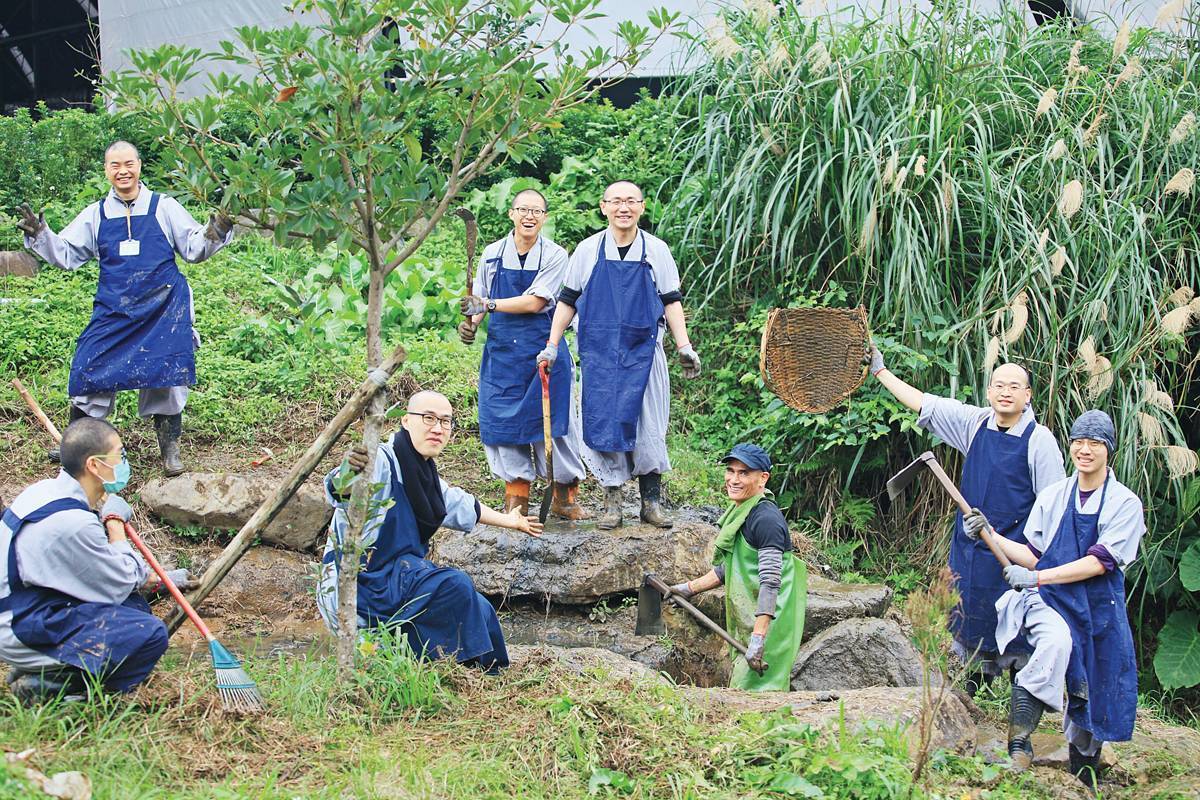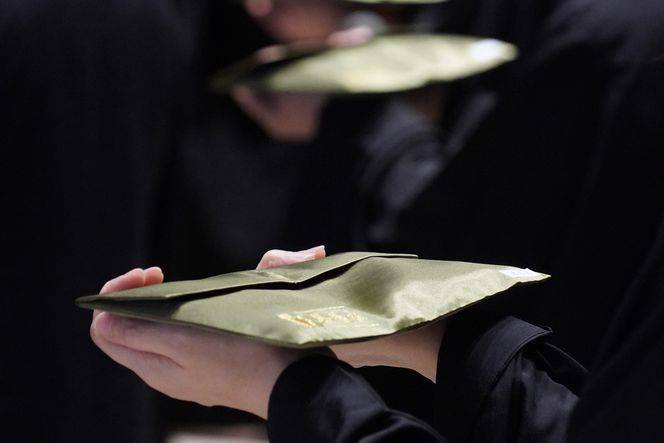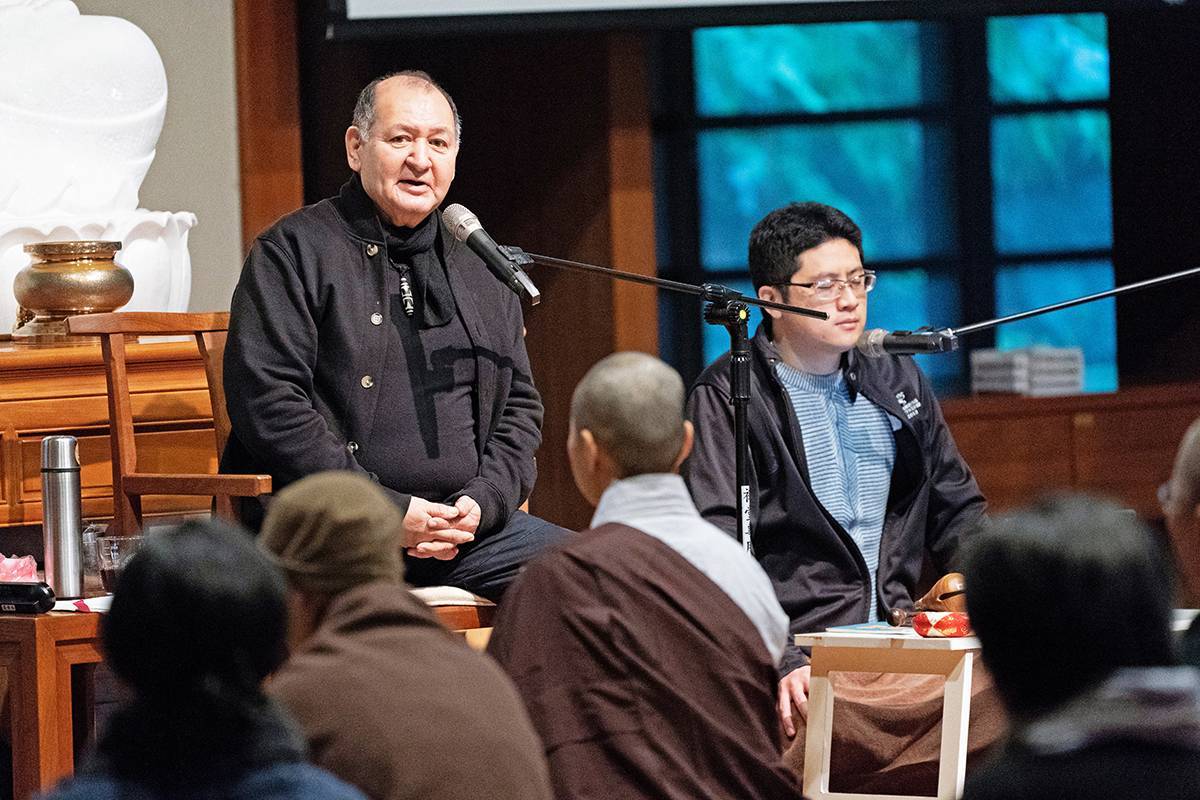News
Mutual Help and Love: Former vice-president Chen Chien-Jen shares his views on “Respecting Heaven and Loving People” for Secret Codes of Happiness program
At 2 pm on June 30, 2020, Chen Chien-Jen was invited to the Secret Codes of Happiness program by the National Education Radio and interviewed by the host Zhang Lijun, talking about his life in terms of his commitments in politics, academic studies, religious belief, and family education. Well known to the public for his warmth and invested as a Knight of the Order of the Holy Sepulchre, the former vice president is an expert in public health and one of the heroes who led the battle against SARS during its 2002-2004 outbreak. “We have to thank the few who sacrifice their freedom to safeguard the health of people in Taiwan." As Chen mentioned in detail, Taiwan's efforts in preventing the pandemic combine smart technology, effective coordination cross government departments, strict border control, constant review of global pandemic responses, and also measures such as self-isolation and home quarantine. Above all, close cooperation by Taiwanese citizens is th...
The Dharma Guides Our Heart to Peace
N.Y. Times Square and neighboring Broadway almost deserted due to the severity of the pandemic, the entire city silenced instantly. The North American pilgrimage team returned from India early January 2020 and disaster struck. On the eve of the Lunar New Year, the city of Wuhan in China was locked down due to COVID-19 outbreak; everyone's attention was shifted to Wuhan. Conflicting reports, speculations and interpretations challenged everyone's determination, wisdom, kindness, and compassion. The only certainty was the rapid increase in confirmed cases and the lack of professional protective equipment for frontline medical personnel. To suffer in the suffering of others – launch of the medical donation project When Wang Cuiyan, President of DDM Dharmapala in North America, proposed the donation project, concern were raised in regards to the scope of this project. Challenges such as fundraising, procurement, and transportation of materials are not easy to overcome. In the next few days, as death toll continued to rise, the Chinese in the United States began to utilize various channels to distribute medical supplies. At this time, we can no longer sit back and watch. With the Sangha's consent, the Abbot President and the Managing Director informed DDMBA to formally establish the donation project. About 5000 medical protective suits and 2669 medical goggles were procured. On February 10, the first batch of supplies arrived at hospitals in Hangzhou from Shanghai by helicopter. This was very encouraging and was made possible with assistance from numerous good Samaritans. However, supplies to Wuhan was laden with difficulties. The task force worked tirelessly to devise a feasible plan, only to meet with a fresh set of challenges the next day and had to formulate an entirely different plan. Nevertheless, we continued to encourage each other and after doing our best, we prayed for the blessing and support from the Dharma-protecting deities. Members of the task force were moved to tears when thank you notes arrived from several hospitals in Wuhan on February 18. At that moment, we truly realized what Master Sheng Yen meant when he said: “to deliver sentient beings from suffering is to be a Pusa (bodhisattva), to suffer the hardship is a great Pusa (bodhisattva)”. It is truly memorable to see the significance and importance of every step in this donation process, no matter how trivial; in order to perform a good deed, there must be those who want to help, those who are in need, as well as the material necessary to support the tasks, all of which are of equal importance. At the end of February, the Chan Meditation Center on the east coast suspended all activities amidst devotees’ concern as the pandemic worsened in New York. The pandemic reached Iran, Italy, England, and other European countries early March; California instituted a statewide “stay-at-home” order on March 19 while New York was locked-down on March 20; residents were prohibited from unnecessary travel. The culture of not wearing face masks in America may have contributed to the severity of the outbreak. In early March, DDMBA directed its resources from the novel coronavirus donation project towards medical institutions, shelters, and vulnerable groups in the United States. Mutual support and benefit; Weathering this disaster together As face masks were sold out in the U.S. at this time, we had to import face masks from China. The issue faced was procuring masks that meet the standard of the U.S. Department of Health and Human Services and importing these to the U.S. We had to determine the material and grade of the face masks produced in China, dealt with discrepancies in the import-export policies between countries, the drastic reduction of flights, the timelines of material delivery, and the daily increase of freight costs, just to name a few. We are deeply grateful to a group of Pusa (Bodhisattvas) who contributed selflessly without expecting anything in return. In addition to assisting in the procurement of compliant face masks, they personally donated tens of thousands of face masks to many retreat centers in the U.S. Many manufacturers, upon learning of DDM's donation to Wuhan, voluntarily gave favorable prices and assistance when required. New York City unwittingly became the worst-hit city in the world for Covid-19, and Elmhurst, home to our Chan Meditation Center, was the most severely affected area. The Qingming (Tomb Sweeping Day in Chinese culture) Earth Treasury Buddhist Assembly was adapted to a 30-day online practice due to the severity and restrictions caused by the pandemic. This practice provided strong emotional support and solace to our devotees all through April. The chanting of sutras were often accompanied by the wailing sirens of police cars, ambulances, and fire engines passing by, constantly reminding everyone of the seriousness of the situation. In response, devotees redoubled their effort in chanting and the transference of merit. In April, flowers bloomed and the spring air was exceptionally crisp and clean due to the statewide lockdown. The City of New York seemed tranquil but beneath that tranquility, social problems such as the death toll of the pandemic, unemployment, loneliness, suspension of schools, homelessness, and plummeting stock prices were waiting to break free at the first opportunity. The coronavirus pandemic put a brake on the fast-moving world, plunging everyone's future into uncertainty at the same time. On the other hand, this pandemic also gave our earth a chance to breathe and an opportunity to revive; moreover, those who led a busy life have a chance to slow down and re-evaluate their relationship with others. In May, the pandemic began to ease in New York City but the future is still uncertain. At this moment, Master Sheng-Yen's encouragement came to our minds: as long as people “have faith, kindness, tranquility, and help each other for mutual benefit”, the world will rebuild itself with a better mechanism of operation and economic model. The co-existence of humans and Mother Nature will be restored. This can only be achieved through the contribution of every single person on Earth. Text: Venerable Chang Hwa (Director, Chan Meditation Center N.Y.) 常華法師 Photo: Yin Wei, Liao (廖胤威) Translation: Chen-Yu, Chang (張振郁) Editing: Elenda Huang (黃儀娟), Leefah Thong
Dharma Drum Institute of Liberal Arts (DILA) Responded to Italy in Pandemic Prevention
As the COVID-19 pandemic spreads rapidly in Italy, tens of thousands positive cases have impacted society severely. The Focolare Movement, the international organization that founded the Sophia University Institute in Incisa Val d’Arno in Tuscany, Italy, established a COVID-19 Communion Goods Fund in Taiwan for the production of face masks. When Dharma Drum Institute of Liberal Arts (DILA) learned of this project, hot responses arose on the campus. By April 30th, 59 monetary donations were collected, mainly from the faculty members and students, including those from the Chung-Hwa Institute of Buddhist Studies and DDM volunteers. DDM International Relations Office helped to transfer the donations to the Focolare Movement under DILA’s entrust, and earmarked for the procurement of machinery and materials that are in need to produce face masks in Italy. In the hope that can support their charitable activities of face masks distribution in the local communities. . Affiliated with the Catholic Church, the Focolare Movement began in Italy as an ecumenical unity effort for spiritual and social renewal, with long term commitments in social charities and interfaith dialogues. In 2013, DILA established sister school relations with Sophia University and has held several religious dialogues and mutual cooperation. In 2019, DILA awarded her Dean, Piero Coda the honorary doctorate degree. In 2020, a The Focolare Movement replied with their sincere gratitude towards our followers upon receiving the donations, and gave prayers for a swift end to this pandemic. Text: Yin-Zhi, Jiang (江胤芝) Translation: Chen-Yu, Chang (張振郁) Editing: Elenda Huang (黃儀娟)
Deepen the Monastic Practice to Build Up Better Strength
As the pandemic of COVID-19 prevails, people are on the edge of fear. In addition to the task of caring for those who are uneasy in society, DDM sangha group seized the chance to practice diligently. Before the monastic retreat in summer, DDM Sangha Education Department and Chan Hall have jointly arranged a 40-day retreat, divided into 5-sessions, from April 21 to May 31 in the Lotus Academy. The retreat is guided by Venerable Chang Sheng (常乘法師), Director of Chan Hall. According to Venerable Chang Sheng, “It is quite different from a short period 7-day retreat, the attitude, the methods, and the practice tempo of a long period retreat. Even as a monastic, it is still necessary for one to return to the fundamental methods and deepen the practices in a gradual manner.” "Now, it may not be feasible for everyone to directly contribute to society during the pandemic; on the other hand, what one can do is to ”equip themselves with better strength" said Venerable Chang Zao (常藻法師), Director of Monastic Continued Education Department. That the monastics deepen their practices is exactly the right approach to equip their strength to serve and bring calmness and peace to the society in the future. Text: Venerable Yan Xiao (演曉法師) Photo: Fan, Lee (李東陽) Translation: Chen-an, Hsiao (蕭宸安) Editing: Elenda Huang, DDM Australian Editorial Team
Coping with the COVID19 pandemic: AFP interviews with DDM Abbot President
In response to the COVID-19 pandemic, group practice activities and classes at Dharma Drum Mountain's monasteries and practice centers at home and aboard have either been cancelled or postponed since January 29, as part of the pandemic prevention efforts to ensure public health. DDM was the first Buddhist organization in the world to introduce on-line real-time group practice as a temporary measure. To find out more about DDM’s online group practice as a prevention effort during the pandemic, AFP (L’Agence France-Presse) had an interview with DDM abbot president Ven. Guo Huei on Friday, March 13, at its Nung Chan Monastery. Buddhist monasteries and temples are considered as official venues for practice, where devotees often find themselves more able to attain calm and peace in mind, especially with the presence of solemn Buddha statues. As Ven. Guo Huei noted, Buddha statues symbolize the Buddhist spirit of compassion and wisdom. By acting in accordance with this spirit, practitioners can help manifest the example of buddhas and bodhisattvas. Therefore, though currently unable to go to a monastery for group practice to avoid mass gathering, people can always be with the Buddha or Bodhisattva by continuing their own regular practices, such as Chan meditation and Buddha-name recitation, at home through online practice programs. The venerable recalled the outbreak of SARS pandemic in 2003, when the late Master Shen Yen happened to be leading a Chan retreat in Moscow. At that time the Master encouraged people in Taiwan to remain calm, and said that by practicing speaking kind words and doing good deeds more often, as well as constantly harboring good thoughts, people can thus transform their fortune, and eventually get through the epidemic crisis. He also urged people to follow the professional advice on epidemic prevention by public health authorities, to better protect themselves as well as protect others from themselves. The Master also stressed the Four Steps of Handling a Problem: Accept it, Face it, Deal with it, and Let go of it. Now confronted with the new pandemic, we can certainly use this guideline. In the interview Ven. Guo Huei once again reminded people of the simple things we can do to protect ourselves and safeguard others during this pandemic: wear face masks when necessary, apply sanitizers, avoid mass gatherings, take good care of self with an easy and relaxed mind, follow a healthy daily routine, keep a balanced diet, and, last but not least, have a good sleep at night, so as to develop better immunity. In addition to the usual timetable, a new online real-time Dharma Lecture program designed by DDM is also taking place at 7.00 p.m. on Fridays starting from this March. While filming the lecture “The Equation of Calming Our Mind” spoken by Ven. Chang Kuan, AFP also showed interest in knowing how the live-streaming equipment was set up before the online class began. Afterwards they visited a DDM follower for a home interview, to record how they went about their real-time online group practice at home. During the home interview, Sabrina Su and her husband, Julian Lin, shared how they indeed found it strange at the beginning, that suddenly they could no longer do group practice at the monastery. By changing their way of thinking, they agreed that through the Internet people can still learn how to settle their mind, and that by participating in Dharma assemblies online, they can also make wishes, praying that the pandemic can soon come to an end. Online practice may lack the feel of interpersonal interaction, but, as they have found out later, the content and essence of the lecture can be equally helpful and useful. With this pandemic outbreak, they said they would certainly work harder in their practice, knowing the fact that unexpected misfortune can happen at any time. They also once again realized that they should grasp every possible opportunity to listen to and learn the Buddhist teachings, on-site or on-line. Text: Patricia Yang, Elenda Huang Photos: Chang, Yao-Chung (張曜鐘) Translation: Elenda Huang Editing: DDM Editorial Team; Chang, Chia-Cheng (張家誠)
A Mind at Peace; A Life at Peace
A Mind at Peace; A Life at Peace Seek calm and stability in the midst of complexity and chaos. With a calm and stable body and mind, we will have peace and safety. Positivity, in its true sense, means that even in the midst of our happiness, we still have others in mind and act for the benefit of others.
Awaking Camp: Starting off a journey of “the enlightened.”
All participants started their experiences from cutting off the hair of the head, followed by practicing majestic presence, ordination ceremony rehearsal, paying homage and respect to ancestral masters, then joining the reunion dinner with monastic group. On the fourth day, all attendees began their formal monkhood experiences from the eight precepts ceremony that symbolized renunciation of vexations. The ceremony was hosted by DDM Abbot President Venerable Guo Huei (果暉法師) as Preceptor, and Vice Abbot as Venerable Guo Xing (果醒法師) as Precept instructor. Through practicing Buddhist etiquettes and majestic manners, participants could walk in to the daily practices of an enlightened and cultivate better understanding in Buddhist and Chan perspectives of life. In addition, under the compassionate aspiration and exemplary lives that Zen Ancestral master and late Master Sheng Yen had shown, they were drilled to the practices that always return to the present moment so as to have a taste of the inherit Buddha nature in oneself. “Does taking precepts constrain our body and mind? “ Venerable Huimin, the Principle of Dharma Drum of Liberal Arts, made a point that “The meaning of precept is to cultivate the good habits, to be freed from those bad ones. Thus taking precepts is in fact the remedy for getting true liberation. “ In answering various sharp questions such as “Does it generate karma if the researchers kill animals for the science experiments?” “What is the true justice?” and “How should we deal with the addictions to the smart phones”, Venerable Guo Xing (果幸法師) brought in the cardinal spirit of Buddhism little by little during the QA sessions. At daybreak, through sincere prostrations altogether, participants prayed Buddha and Bodhisattva’s merciful bless on all sentient beings. In the last evening, the Night of Appreciation, Camp Director Venerable Chang Xing (常惺法師) and Monastic Advisor Venerable Yan Dao (演道法師) guided all attendees trying to put into action based on the insight of self-reflections and self-awareness been cultivated over the past 10 days, followed by sustaining the strength as if the inexhaustible lamp. “In the next three decades of my life, I hope to have a root-and-branch revamping in my mind.” Chen, Yan Hong (陳彥宏), who used to engage in caring for terminal cancer patients, could accordingly put efforts onto practices through contemplating his habitual tendency of craving and escaping. Coming from the U.S. and called herself as an academic person, Tian-Jing (田靜) shared her feeling that “In here, I clarify many questions of my doubts and questions deep inside and thus have a spiritual dialogue with late Master Sheng Yen.” Even with less sufficient Mandarin proficiency, through the explanations and supports from the teammates, she was very delighted and fully engrossed to the first-encountered Buddhist etiquettes and majestic manners learning. To conclude, Venerable Chang Xing agreed to the point that, “We are not in an urge to aspire anything, or trying to make any significant achievements; whereas stay unruffled and fully focused on every encounter at each of the present moment." Texts: Dharma Drum Monthly Photos: Lee Fan (李東陽); DDM Sangha University Translation: Elenda Huang Editing: DDM Australian Editorial Team
Lay Bodhisattva Precepts: 1163 laities receive the precepts at DDM, resolving to learn the bodhisattva’s action
Ven. Guo Huei (果暉法師), abbot president of DDM, Ven. Hui Min (惠敏法師), DDM’s chief-seat monk, and Ven. Guo Pin (果品法師), vice abbot-president of DDM, served as the Bodhisattva Dharma teachers to transmit the Four Objects of Indestructible Faith (四不壞信法), the Three Sets of Precepts for Purity (三聚淨戒), the Ten Good Deeds (十善戒), and the Ten Inexhaustible Precepts“ (十無盡戒), to the precept recipients. They then put the Buddhist scarf over their neck that symbolizes the identification of a bodhisattva, wrapping up the 24th Lay Bodhisattva Precepts ceremony.Praising the recipients’ merit in taking the precepts, Ven. Guo Huei wished them a “Happy Birthday,” congratulating them for having acquired a human physical body in this lifetime and the identity as a bodhisattva practitioner today, to facilitate the realization of their own Dharma-body in the future, just as past buddhas have. By quoting the Mahā-prajñāpāramitā Sūtra as explaining the essence of the Four Great Vows, Ven. Guo Huei emphasized that for personal practices one should first focus on one single method, and vow to learn infinitive Darma methods for the sake of delivering sentient beings. In practicing the bodhisattva path, even when one has acquired the wisdom regarding emptiness, one should understand that it represents an expedient means rather than the ultimate goal. The ultimate goal should be delivering sentient beings without having any notion of doing so, and vow to attain supreme enlightenment. In conclusion, the venerable gave his blessing to all the precept recipients on behalf of DDM Sangha, by using the verse: May I sever all evil. May I cultivate all good. May I master all Dharma methods. May I deliver all beings. May I attain the supreme Buddhahood. Texts: Lin, Ya-Ying (林雅櫻) Photos: Lee Fan (李東陽); Lin, Ya-Ying (林雅櫻) Video: Lin, Ya-Ying (林雅櫻) Translation: Elenda Huang (頤嵐達) Editing: DDM Editorial Team; Chang, Chia-Cheng (張家誠)
Gilbert led the 7-day retreat in Taiwan
According to Gilbert, he led the Chan retreat similar to Master Sheng Yen’s style during the early years, combing the Right View with the method of Chan practices. During the 7-day retreat, three dharma talks were given on a daily basis, underlining the recorded saying of Master Linji (臨濟禪師), Master Huang bo (黃檗禪師) and Master Xuyun (虛雲老和尚). Gilbert substantially stressed the Right View, as it represented how we perceive the working principles of mind, which is the only approach to eradicate our vexations. During the retreat, Gilbert left the Q&A sessions after the talks, his answers inspired most of the practitioners to see through their blind spots in practices. A practitioner once raised his doubt, “When contemplating a flower, we are able to maintain inner serenity. Yet when confronting a murderer or a culprit, how can we sooth the mind of the victims and their family?” Taken as an example, Gilbert shared one story told by Master Sheng Yen: a taxi driver ran over a child and a wife of a family in a fatal accident. By the promising to take care of the victim's family, the driver felt relieved to take on the liability. Gilbert further expounded one who can see through the façade and understand the law of causes and conditions won’t choose the sanction that seems to be the most straightforward and just. They would rather choose to forgive, let go, and make no further malevolent causes, which is also a way to terminate the tangles generated from the accumulated past lives. The criminal today may be once the victim, suffering oneself likewise at the current moment. Julien Roy, who is a non-believer coming from France, drastically changed his impression on traditional Buddhism after Gilbert’s vivid dharma talks, which moved him to understand more of Buddhism. At first, Ben Conway from Australia couldn’t accept the action of the prostration. Then he became more and more blissful when he understood upon Gilbert’s explanation that the prostration is actually for the worship of our own self-nature. In the end, Gilbert encouraged the practitioners to keep on the practices after the retreat, and invited all attendees to join together in the Chan Hall next time. Texts: Qiu, Hui-min (邱惠敏), Dharma Drum Mountain Monthly Photos: Lee, Fan (李東陽) Translation: Elenda Huang (頤嵐達) Editing: DDM Australian Editorial Team
Buddha’s Birthday & Family Day – Protect the Spiritual Environment through Learning Buddhism Practices
At 10.00 AM, DDM Abbot President Venerable Guo Hui (果暉法師) ,the Commissioner of City Affairs Department, Lan Shi-Cong (藍世聰), the Vice President of S.Y.S. Memorial Hall, Yang Tong-Hui (楊同慧), President of DDM Association of Dharma Supporters Chang Chang-Pang (張昌邦), as well as Youth representative Tsai Mini (蔡旻霓) pray together to pledge a wish for the world, “We pray for the growth of merits and wisdom in everyone; for world peace and people’s ease and happiness; For warding off disasters and hindrances; for the relief from distresses and enjoyment of happiness; For widely cultivating virtuous affinities; for liberating from suffering through benevolent acts toward self and others; We bathe the Buddha with purified Chan mind; we wish there are few vexations in this world.” The Commissioner Lan Shi-Cong, attending the feast for 5 consecutive years, sounded the Lotus Bell together with DDM Abbot President Venerable Guo Huei, and gave his benediction on behalf of the Taipei City Government, “With a purified mind, we bathe the Buddha., With Chan practice, we bathe our mind.” “Make a good wish on Buddha’s Birthday, and make it come true. Put our wish into action, and bring goodness to the world. ” “Chinese Chan Buddhism has a unique way to pay homage on Buddha’s Birthday through pouring fragrant water and bathing the Buddha statue.” Venerable Guo Huei made a point that Buddha is a human being with perfect wisdom and great compassion; according to the Buddha, every person can attain Buddhahood as the innate Buddha-nature is inherited within every sentient being. People living in the modern society truly need the warmth from the great compassion and the refreshing wisdom. Every one of us can first learn from the Buddha and then share the wisdom and compassion with our family, the society and the whole world. DDM President Abbot further made his encouraging remarks, “Mothers, symbolizing lasting love and compassion, are selfless givers and dedicated providers., Buddhism is a religion that values bearing gratitude in mind, repaying kindness, and expressing gratefulness. As Master Sheng Yen once said, “First and foremost, be grateful and repay kindness; benefit others and you benefit yourself.”” The Abbot President hoped that the public would experience the merits of wisdom and compassion from Chan practices, and be grateful for Buddha’s and mothers’ graceful kindness. In legend, Buddha was born, enlightened, and went into nirvana under trees. On the square where the activity was held, there set a magnificent and gracefully adorned tree that represented Buddha’s birthplace. To show gratitude to the treasured teachings of the Buddha, nearly 7000 participants practiced water-bowl meditation, walking along the isles under the blue-cloth archway that symbolized pouring water from heavenly dragons, and then bathed a portrait of baby Prince Siddhartha with the fragrant water. This process symbolized how dharma teachings refresh people’s dharma-body like embrosia. The focus of the Family Day was environmentalism education and resources protection. Volunteers were creative to repurpose used-CD, table tennis balls, and clothes hangers for eco-friendly handcrafts and toys for children. Aided with the short phrases that crystalize the basics of Chan practices, “wherever your body is, your mind follows; clarity and relaxation through your whole body”, both parents and children learned to cultivate their attentive powers through joyful playing. The activity of body-painting let family members express their creativity and at the same time enforce their bonding. Through the game of painting their wishes on the faces and hands of each other, family members passed on their aspirations to the next generation. As a show of commitment to low-carbon and green style of living, Wang, Hui-Shu (王惠淑) brought more than 20 family members from 3 generations to help out at the event as volunteers. Many wife-husband pairs, mother-daughter pairs, or the entire family joined the Choir performance and service teams, bringing full warmth into the National Dr. Sun Yat-Sen Memorial Hall. Texts: Lin, Ya-Ying (林雅櫻) Photos: Lee, Fan (李東陽); Lee, Jia-Chun (李佳純); Liao, Shun-De (廖順得); Wang, Yu-Fa(王育發); Chang, Tian-Pei (張田沛); Lin, Ya-Ying (林雅櫻) Translation: Elenda Huang Editing: DDM Editorial Team; Yeh, Shujen (葉姝蓁)

